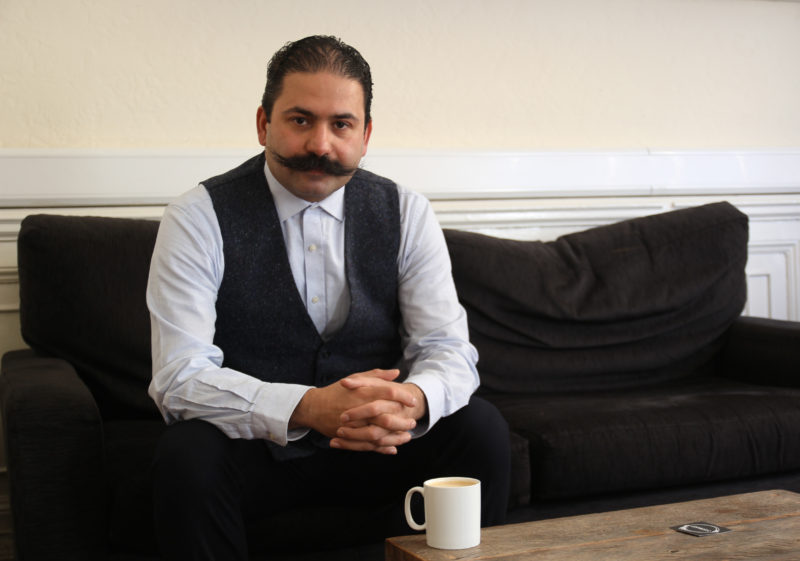
Originating in Iran before embedding itself within Dublin’s subterranean cultural scene, Experimental Film Society is the realisation of filmmaker Rouzbeh Rashidi’s long-held and deeply personal conceptualisation of avant-garde cinema. Now a fledgling, yet prolific, production and screening company it also boasts an extensive film archive, a video on demand service and a litany of film criticism in the form of EFS Publications.
Speaking to The University Times, Rashidi is eager to emphasise the fact that the Experimental Film Society is a fundamentally collective endeavour, despite principally owing its genesis to his own individual vision and imagination. Rashidi believes that the cross-pollination effect of having different, sometimes clashing, perspectives working on the same project can facilitate the production of exciting, new ideas.
Reflecting on his early days in Ireland spent seeking out fellow innovative film-lovers, with a view to building up the foundations of the company, Rashidi explains: “I did this because I find that once you have this collective energy something really magical happens, even though there is not necessarily any money, any audience, any structure for distributing the films.”
Rashidi is quick to stress that he is by no means convinced of the romantic notion that zero-budget productions allow for greater artistic freedom, or integrity. Indeed, he asserts that he welcomes the fact that his company is now able to professionally fund some of its output.
To his mind, all that financial hardship brings is difficulty in producing the work one envisioned in the first place. Not only this, but it diminishes the chances of one’s work reaching a level of aesthetic and technical complexity, due to a lack of resources. In this sense, Rashidi has rubbished the anarchic maxim that with money comes compromise, arguing that the opposite can often be the case – that is, so long as the money only acts as a means of bringing the art into being, and doesn’t become an end in itself.
On this point, Rashidi insists that “it is simply a myth that without money you have more artistic freedom or purity. It’s extremely frustrating to work without money because there is a limit on what you can do and create”. In fact, Rashidi struggled financially for 11 years before the Arts Council of Ireland took greater interest in the company and was willing to increase its funding.
Throughout the discussion, Rashidi plucks a variety of profound quotes from iconic figures such as Orson Welles, Federico Fellini and Jean-Luc Godard with a panache and ease, flaunting his credentials as a bona fide aficionado. Yet, perhaps the quote that provoked Rashidi’s most thoughtful and passionate contribution was one from David Lynch: “I don’t know why people expect art to make sense. They accept the fact that life doesn’t make sense.” Echoing Lynch’s sentiment, Rashidi claims it is not understanding that should be made cinema’s quarry, but mystery.
He explains that, “for me, if I knew why I wanted to make a certain film, then I wouldn’t bother to make it in the first place. It is a deeply personal and mysterious process for me and one of constant discovery about myself”. Thus, Rashidi’s work is the product of an intimate creative process, during which he finds himself powerless to his art: “It is almost like being guided by the film. I don’t know what I want to say before I begin to create, it is not preconceived. The film has control over me, not the other way round.”
Later in the interview, Rashidi speaks with a palpable urgency of the superior value of working solely for the here and now, rather than obsessing over some fetishised legacy one will never get to enjoy. Everything the company does is suffused with a desire to make immediate, impactful cinema in the present tense.
Rashidi declares, with an admirable candour and sincerity, that making film is the only reason he is still alive. Hence, it is no wonder that, for him, cinema is about feeling truly alive and in-the-moment, not simply something to be hijacked as a scheme designed to bring posthumous appreciation: “Of course, many filmmakers crave a kind of immortality, to be mummified and preserved. But for me it’s not about that. I don’t care about what happens after I die. I want to make films, see films with you, together, right now.”
For many years now, Rashidi has grown sceptical of the term “independent”. This, he explains, is due to the description of many films as “independent” which on closer inspection, actually fall outside of this category. Instead, he favours the term “underground” when characterising the movement that he, and the Experimental Film Society, stand at the vanguard of.
The example that Rashidi has set proves, above all else, that should any artist feel as though they do not fit into any one existing category, they must be courageous and bold enough to construct one all of their own.






